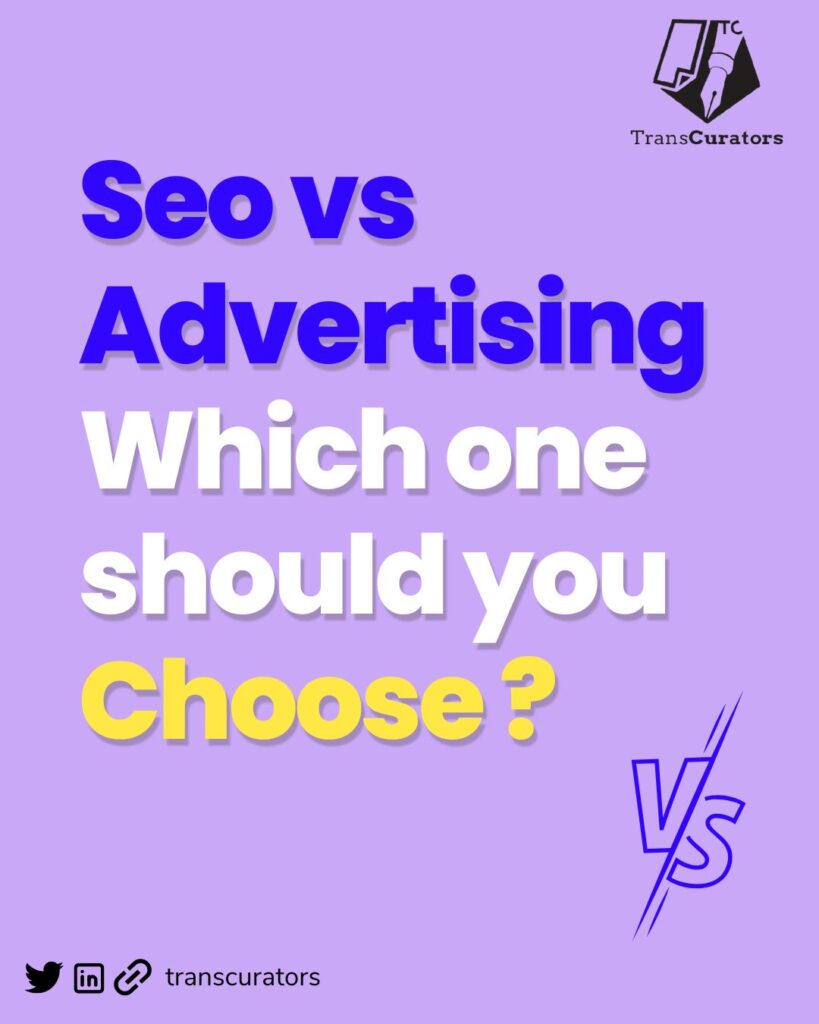Introduction
In the current digital era, it is crucial for businesses to have an online presence for their potential clients. However, due to intense competition, selecting the appropriate marketing approach can make a significant difference. Two popular strategies are Search Engine Optimization (SEO) and advertising. This blog post explores the advantages and disadvantages of SEO and advertising to help you determine which strategy is best for your company. SEO involves optimizing your website to rank higher on search engine results pages (SERPs) for specific keywords, with the goal of attracting organic traffic to your website. On the other hand, advertising, also known as PPC (Pay Per Click) or SEM (Search Engine Marketing), refers to paid marketing campaigns across various platforms, including search engines, social media, and display networks. By understanding the pros and cons of each, you can make an informed decision that will help you achieve your business goals and answer the question of “SEO vs. Ads.”
Seo vs Advertising
Below is a detailed table that outlines the difference between ads and SEO and the different criteria used to assess the effectiveness of each strategy.
| Parameters | SEO | Advertising |
| Cost | SEO is often considered a long-term investment because it takes time to establish and deliver results. However, once your website has climbed the search engine rankings, its traffic is free. Despite requiring an initial investment in website optimization or content creation, SEO can ultimately prove to be cost-effective over the long term. | Although advertising can immediately boost traffic and sales, it may come at a high cost, particularly when targeting competitive demographics or keywords. As advertising campaigns have a limited lifespan and necessitate constant optimization and maintenance, it requires continuous investment. |
| Target Audience | SEO aims to generate informative content for your intended audience with the objective of presenting the information your audience seeks while ensuring your website ranks higher on relevant SERPs. Employing SEO can help you acquire highly targeted traffic with a greater likelihood of converting into customers. | Creating well-targeted ads for your specific audience is a crucial aspect of advertising. With the help of platforms like Facebook Ads and Google Ads, you can target users based on their demographics, interests, and behaviors. This means you can design ads that are highly specific and more likely to be viewed by people who are most likely to have an interest in your product or service |
| Traffic | Organic search results on search engines drive traffic for SEO, which is typically of higher quality since it is based on specific keywords that users are actively searching for. However, SEO can take time to establish and may not generate an immediate surge in traffic. | Immediate traffic boost can be achieved through paid advertising placements on websites, social media platforms, or search engines. However, this traffic may not be as targeted or high-quality as organic search traffic, as it is not necessarily driven by specific keywords or user intent. |
| Results | Although SEO can offer long-term and sustainable outcomes, having a top position in search engine results pages that can generate organic traffic for years, it may take considerable time to establish and see noticeable results. Additionally, there needs to be an assurance of obtaining a high ranking. | By tracking and analyzing campaigns’ effectiveness, advertising can bring immediate and measurable benefits. However, it is essential to consider that advertising campaigns have a limited lifespan and require continuous investment, resulting in short-term outcomes. |
| Placements | SEO enables your website to appear in the organic search results of search engines like Google or Bing, which is achieved by various factors, including the quality and relevance of your website’s content. | A paid campaign determines one’s advertisement placements. By targeting specific keywords, demographics, or interests, ads can be displayed in designated areas on search engines, social media platforms, or other websites. |
Conclusion
When deciding on marketing strategies to create an online presence and increase website traffic, companies often ask the question, “Which is better, SEO or Google Ads?” To sum up, SEO and advertising can be effective marketing techniques for companies seeking to establish an online presence and enhance website traffic. Although SEO may take more time to generate sustainable results, it can eventually save money and bring in well-targeted traffic. Conversely, advertising can deliver immediate and measurable benefits, but it necessitates continuous investment and may not be as focused or high-quality as organic search traffic. Ultimately, the decision between SEO and advertising depends on your company’s objectives, budget constraints, and target audience. It’s essential to evaluate the pros and cons of each strategy carefully before choosing one that aligns with your company’s goals.
